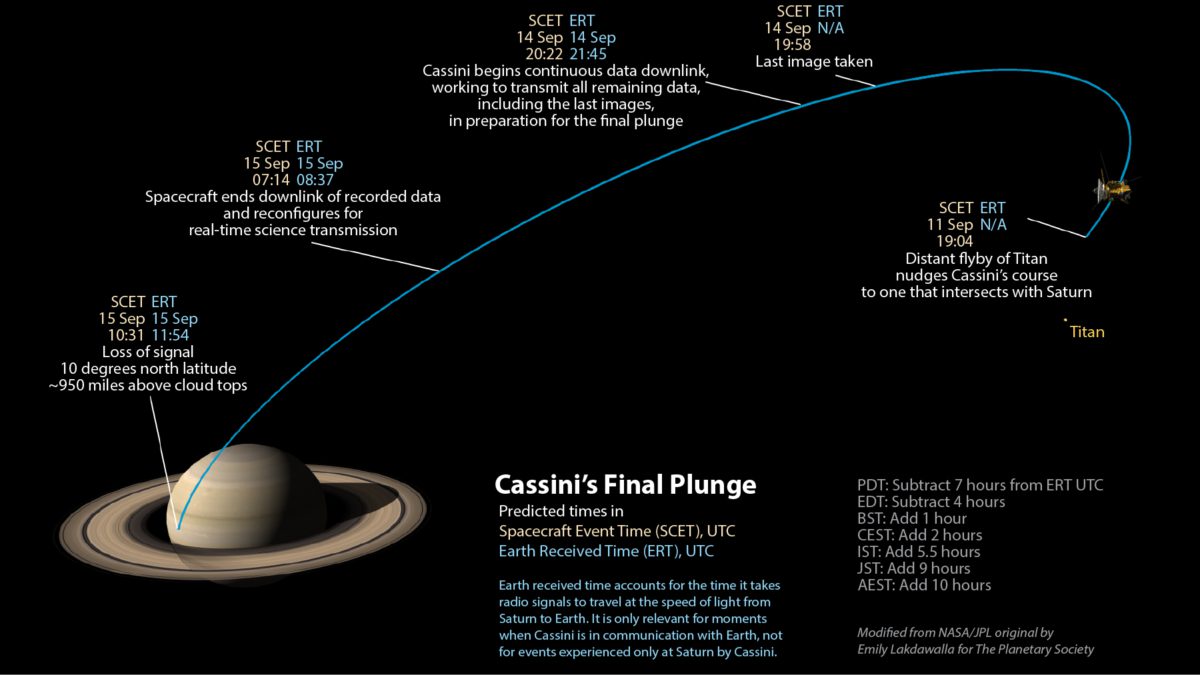Emily Lakdawalla • Sep 11, 2017
What to expect during Cassini's final hours
The Cassini mission is the longest-lived orbiter flying beyond Earth. We are now just days away from its end. I will be at the Jet Propulsion Laboratory for Cassini's last three days, keeping vigil over it as I did for Rosetta last year. If you're a member of the media who will also be at JPL this week, I'd like to hear from you.
Here is a look at what to expect from the great mission during its final hours. The information in the table below is sourced from the NASA Cassini End of Mission press kit; a media advisory emailed from JPL; and Jason Perry's final Cassini Looking Ahead article.
We are going to be shoveling images from Cassini into our image library this week. A lot of them are processed by space imaging enthusiasts and aren't available on NASA websites. Check out the images in the Saturn section of the Bruce Murray Space Image Library, or a list of all the photos in the library that are tagged "Cassini," or all amateur-processed Saturn system images on our site.
One chart I made that may be useful to people not in California for the end-of-mission event: a visual timeline with times reported in Universal Time, UTC:

| Event | Cassini time at Saturn | Event time on Earth | ||
|---|---|---|---|---|
| UTC | PDT | EDT | UTC | |
| Final passage between rings and Saturn Middle of Rev 292. Closest approach to Saturn is 1680 km above cloud tops. Cameras shoot a movie of rings from between rings and Saturn. | 9 Sep 00:08 | -- | -- | -- |
| Data downlink begins Data from final Grand Finale dive | 9 Sep 13:07 | 9 Sep 07:29 | 9 Sep 10:29 | 9 Sep 14:29 |
| Final distant Titan flyby Closest approach to Titan is 119,049 km above surface. Lots of imaging planned, looking for clouds and mapping lakes. Final RADAR observation will measure altitude across small north polar lakes. | 11 Sep 19:04 | -- | -- | -- |
| Apoapse End Rev 292, begin Rev 293 (final Rev). 1.3 million km from Saturn. | 12 Sep 05:27 | -- | -- | -- |
| Data downlink begins Final Titan data | 12 Sep 23:56 | 12 Sep 18:19 | 12 Sep 21:19 | 13 Sep 01:19 |
| JPL news conference Available on NASA TV and online | -- | 13 Sep 10:00 | 13 Sep 13:00 | 13 Sep 17:00 |
| Final image taken On September 13 and 14, Cassini will take its last wide-angle mosaic of Saturn and its rings. It will watch Enceladus set behind Saturn. It will look for clouds on a half-phase Titan. It will observe "Peggy," a clump of material at the edge of the A ring. It will observe propellers in the rings. Then VIMS will observe the future impact site, which will be on Saturn's night side. | 14 Sep 19:58 | -- | -- | -- |
| Begin continuous data downlink Cassini will transmit from now until the end of mission. Goldstone is initially the receiving station. | 14 Sep 20:22 | 14 Sep 14:45 | 14 Sep 17:45 | 14 Sep 21:45 |
| Final images expected to appear online Time is approximate. | -- | 14 Sep 20:00 | 14 Sep 23:00 | 15 Sep 03:00 |
| Data downlink continues at Canberra | -- | 14 Sep 20:15 | 14 Sep 23:15 | 15 Sep 03:15 |
| Cassini passes orbital distance of Enceladus 238,020 km from Saturn's center | 15 Sep 05:08 | -- | -- | -- |
| Cassini rolls The roll will take 5 minutes. It points INMS toward Saturn. | 15 Sep 07:14 | -- | -- | -- |
| Real-time transmission begins Cassini reconfigures from an orbiter to an atmospheric probe, beginning to relay all data to Earth as it is aquired at 27 kilobits per second, with a 2-3 second latency. | 15 Sep 07:14 | 15 Sep 01:37 | 15 Sep 04:37 | 15 Sep 08:37 |
| Cassini passes orbital distance of F ring 140,180 km from Saturn's center | 15 Sep 07:22 | -- | -- | -- |
| NASA TV broadcast begins Available on NASA TV and online. In addition, an uninterrupted, clean feed of cameras from JPL Mission Control, with mission audio only, will be available during the commentary on the NASA TV Media Channel and on Ustream. | -- | 15 Sep 04:00 | 15 Sep 07:00 | 15 Sep 11:00 |
| Atmospheric entry begins 1920 km above cloud tops. Thrusters firing at 10% of capacity | 15 Sep 10:30 | 15 Sep 04:53 | 15 Sep 07:53 | 15 Sep 11:53 |
| Expected loss of signal 1510 km above cloud tops. Thrusters at 100% of capacity, no longer able to maintain attitude. | 15 Sep 10:31 | 15 Sep 04:54 | 15 Sep 07:54 | 15 Sep 11:54 |
| NASA TV broadcast ends | -- | 15 Sep 05:30 | 15 Sep 08:30 | 15 Sep 12:30 |
| Post-finale press briefing Available on NASA TV and online. | -- | 15 Sep 06:30 | 15 Sep 09:30 | 15 Sep 13:30 |
| Event | Cassini time at Saturn | Event time on Earth | ||
| UTC | PDT | EDT | UTC | |

Support our core enterprises
Your support powers our mission to explore worlds, find life, and defend Earth. You make all the difference when you make a gift. Give today!
Donate

 Explore Worlds
Explore Worlds Find Life
Find Life Defend Earth
Defend Earth

